This page features a rotating set of profiles that highlight members’ past and ongoing research activities. We’re proud to have a growing body of diverse research dedicated to the study of NGOs. If you would like to have your current project featured on this page, please submit a description of your research, including its location, timeline, the current stage of research or analysis, and any other information you find relevant to ngoanthro@gmail.com, with photos that capture your observations and experiences.

Amanda J. Reinke is a doctoral candidate in the University of Tennessee’s Department of Anthropology and Disasters, Displacement, and Human Rights Program. Currently, her research investigates the use of alternative justice – models of conflict resolution outside purview of the formal legal system – to advocate for social justice in spaces of rapid urban renewal. This project engages alternative justice practitioners, for-profit, and non-profit organizations offering conflict resolution services and advocating for social justice throughout the San Francisco Bay Area.
Continued urban renewal throughout the Bay Area is partly driven by the influx of technology and start-up workers, many of whom move into communities formerly home to low-income, working class, and marginalized racial groups. For example, the Mission District, historically a community comprised of predominately Hispanic immigrants and working class families, is being gentrified, with all the radical landscape and community changes it entails. The result of rapid gentrification is soaring housing and rent costs, transforming communities, and increasing no-fault evictions courtesy of the Ellis Act. Property conflict, community activism against gentrification, and political tensions are growing. This is where conflict resolution organizations enter the scene.
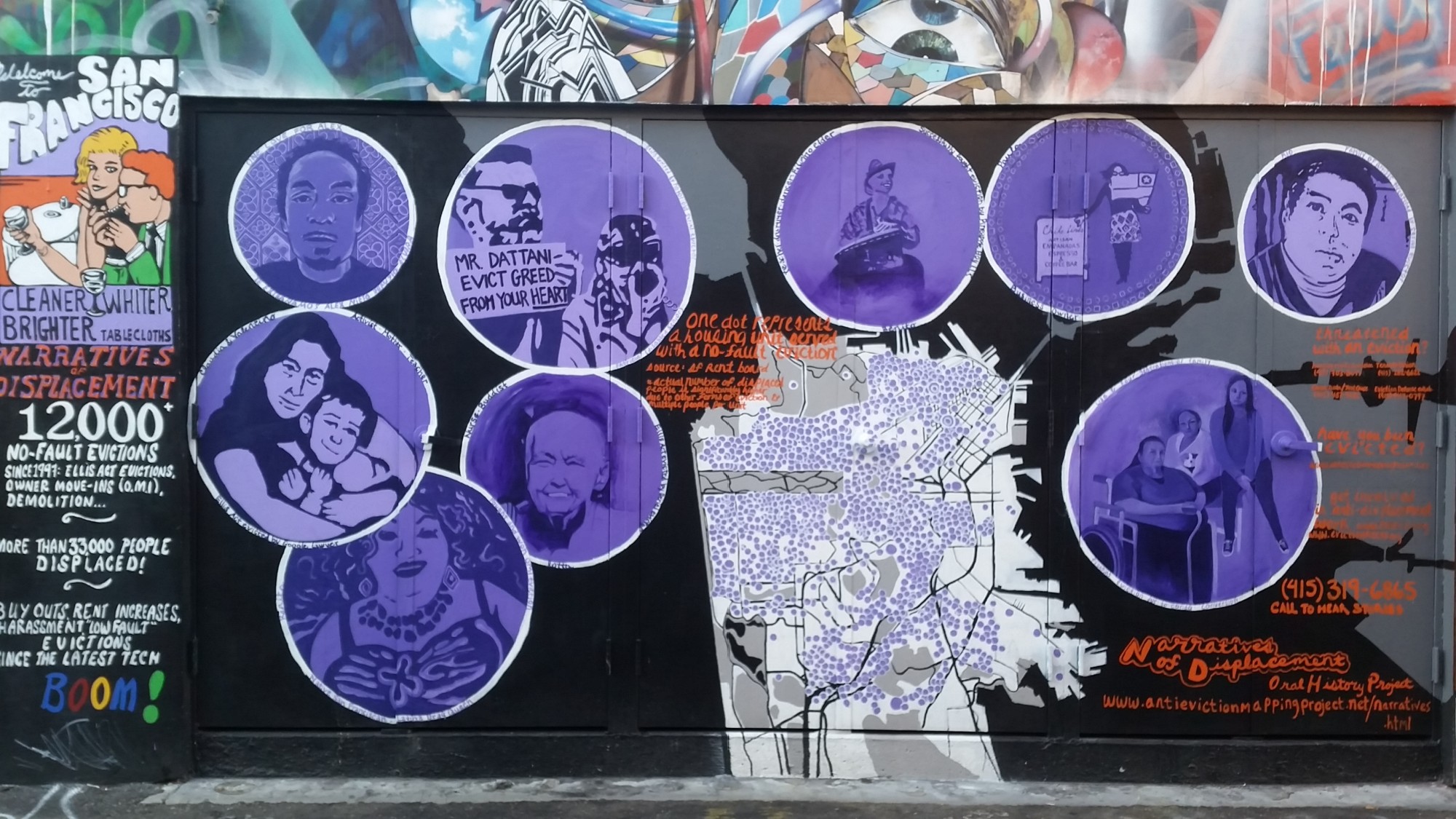
Alternative justice models aim to offer non-destructive conflict resolution that is informal, community- or neighborhood-based, and focuses on empowering, building the capacity, and healing people in conflict. In many ways, it is defined in opposition to the formal legal system, characterized as harmful, disempowering, and antithetical to community. Alternative justice practitioners espouse the naturalness of their craft, citing ethnographic documents from the early to mid-1900s to prove the innate desire humans have to resolve conflict in a restorative rather than retributive fashion.
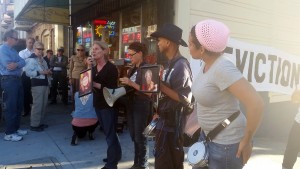
Alternative justice practitioners cling to their narratives espousing the naturalness of their craft, while grappling with the rapidly shifting urban environment. In spaces of rapid urban transformation, conflict resolution practitioners often scramble for political support of their endeavors and funding for their programs. As a result, alternative justice practice becomes embedded in and replicates the system of structural violence it originally set to combat. In these rapidly shifting physical, political, and economic landscapes, how do alternative justice practitioners imagine and attempt to actualize social justice through conflict resolution? How do organizations grapple with economic instability and a challenging political landscape? What is the result for social activism and inactivism in the Bay Area?
These questions are central to Amanda’s current research agenda. Working alongside communities, practitioners, activists, and organizations, this project is situated in anthropology, but draws upon cognate disciplines to investigate how alternative justice models are strategically used to advocate for social justice in spaces of urban renewal.
Christian Vannier is an independent scholar whose work focuses on the principles of community-based organization in Haiti and West Africa. Currently, his research in southern Togo analyzes the actor-centric networks of traditional religious and micro-economic organizations that together provide moral values and mutual aid practices for members in a context of political repression and economic penury.
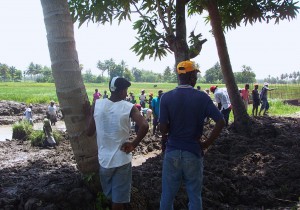
Christian’s research program in NGO Studies began by working with community-based farmers’ organizations and the intellectual-professionals that constitute the field staff of transnational aid and development NGOs in southwest Haiti. Analyzing the social networks and institutional practices of local and transnational NGOs allow the researcher insight into processes of meaning making regarding the often politicized practices of development. Christian’s research continues with ethnic Ewe fishermen along the Bight of Benin coast in Togo. Here, actors negotiate complex overlapping systems of economic and religious organization to secure political and economic safety and certainty. Fishermen form local unions to protect themselves during poor fishing seasons. Fishing pirogue owners join together in mutual aid associations. Market women arrange micro-loans to one another via independent societies.
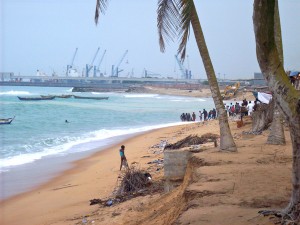
Underlying these economic organizations is the moral authority provided by indigenous religious specialists. “Traditional religion,” or vodu, informs norms and values of economic development and create spaces of human rights in a political context of dictatorship, poverty, and repression. Community-based religious organizations provide for members alternative socio-political hierarchies based on reciprocity and offer spiritual protections against the violence of the state. Also, organizations of priests provide members with an alternative legal framework in spaces the government will not tread and is not wanted: black magic (bovodu), witchcraft (aze), and violence between kin (maso maso).
As the withdrawal of services, petty corruption, and the suppression of political and civil rights force people to disengage from the state; and the forces of globalization create economic uncertainty, individuals and groups come together and organize to construct political alternatives and economic securities for themselves and their communities. In Africa as in Haiti, the social contexts of NGOs become shared cultural spaces in which agents act and negotiate to achieve goals based upon their own social positions and worldviews.
Kimberly Walters is an assistant professor of International Studies at California State University, Long Beach. She graduated from the Department of Comparative Human Development at the University of Chicago in August 2015 with a dissertation entitled Sympathy-scapes: Sex Work and the Shifting Sands of Humanitarianism in South India. Her doctoral research traces the many impacts of transnational funding for anti-trafficking on community-based organizations (CBOs) of female sex workers in South India.
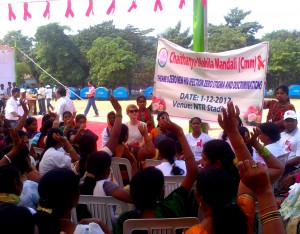
During the course of my doctoral fieldwork from 2009 to 2013 at a community-based organization in Hyderabad, India, I watched the rapid decline of HIV-prevention discourse intended to empower female sex workers. Sex worker empowerment in the name of HIV-prevention is now being out-funded by an opposite approach to prostitution from a new transnational powerhouse—the anti-trafficking movement, which understands sex workers to be ‘modern-day slaves.’ I argue that the global charitable market for stories of the rescue of trafficked women creates demand for narratives of victimization that map easily onto the master narratives of intentional and organized crime that the anti-trafficking movement itself has popularized.
Anti-trafficking organizations, consequently, cultivate such narratives among Indian sex workers, most of whom did not previously produce them. These salable stories of ‘trafficking’ conceal the problems of wealth distribution and the cultural specifics of kinship, love, and marriage that propel women into sex work in this region. As HIV prevention is eclipsed, the anti-trafficking movement unwittingly consolidates the very gender norms that make it likely for Indian women to initially enter sex work. Appetites in the global north for rescue narratives thus effect a new form of force in the lives of sex workers in the global south.
Erica Bornstein is an Associate Professor of Anthropology and the Faculty Coordinator of the International Studies Program at the University of Wisconsin-Milwaukee.
Erica’s research focuses on the ethnographic analysis of non-profit and non-governmental organizations. Her book, The Spirit of Development: Protestant NGOs, Morality, and Economics in Zimbabwe (Routledge 2003; Stanford University Press 2005) is an ethnography of transnational, faith-based NGOs. Based on research conducted in Zimbabwe, Africa in 1996-97, the project explores the politics of Christian faith in international humanitarian assistance and analyzed the significance of Christianity in the economic development of southern Africa. The book interrogates how discourses of economic development merge with discourses of faith, and questions the assumption that economic development is a move away from the logical ambiguities of mysticism toward the scientific promise of technological advancement. Her subsequent project emerged from ethnographic research conducted in New Delhi, India in 2004-05. This research (since published as a book: Disquieting Gifts: Humanitarianism in New Delhi, Stanford University Press 2012), is an ethnographic analysis of sacred and secular practices of giving. Although most scholars of humanitarianism and philanthropy agree that sponsoring the education of an orphan or giving to beggars on an urban street is not considered in the same category as international humanitarian aid, the two forms are linked through the gift — which merges those who are excluded from resources with those who are willing and able to actively engage. Disquieting Gifts explores how economic development, charity, philanthropy, and humanitarianism, are part of a larger universe of giving marked by reciprocal exchange, social obligations with rights and entitlements, and worldly renunciation. A new space of inquiry opens when different social forms of the gift – each with their own expectations and grammar – speak to each other and are brought together in the global economy of aid. She co-organized an advanced seminar on the anthropology of humanitarianism at the School for Advanced Research with Peter Redfield, the results of which have been published as a co-edited volume: Forces of Compassion: Humanitarianism Between Ethics and Politics (School for Advanced Research Press 2011). Bornstein’s current research focuses on the regulation of the voluntary sector in India. In 2012-13 she spent a sabbatical year in New Delhi, researching the global and legal regulation of the voluntary sector. Her current ethnographic work is situated at the crossroads of non-profit sector activism and state regulation, and focuses on a voluntary sector membership organization that lobbies the government for legislative change.
Ralph Bolton is a Professor of Anthropology at Pomona College. He is also the founder and president of a nongovernmental organization based in Peru called the Chijnaya Foundation.
Ralph has a longstanding research interest as an applied anthropologist in seeking ways to improve the lives of poor farmers in communities in the Andes, particularly in the small highland village of Chijnaya, Peru, where he first worked while serving in the Peace Corps. At that time, he organized and directed field operations for an agrarian reform project. He returned to the community in 2004 and a year later created The Chijnaya Foundation, which works in partnership with Chijnaya and other rural communities in Southern Peru to design and build self-sustaining projects in health, education and economic development. The Chijnaya Foundation works in partnership with rural communities in Southern Peru to design and implement self-sustaining projects in health, education, and economic development.
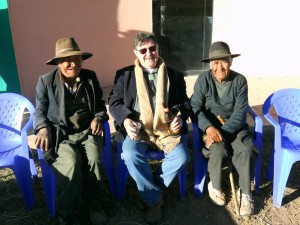
By providing humanitarian, technical, and development assistance to communities in the Andean highlands of Southern Peru, the Foundation is able to administer grants and loans, technical expertise, and research in agriculture, health, small industry, traditional crafts, housing, and community services, all focused on improving the cultural and economic well-being of indigenous Andean people. As the founder and president of an NGO, Ralph was interested in the creation of the AAA Interest Group, and supported its inception. He hopes that the work of NGOs can be made more effective as the result of research on how nonprofits function.
Ralph also has primary research interests in the domains of human sexuality and medical anthropology. He has been engaged in research on AIDS prevention issues for almost 15 years. Following a Fulbright semester in Belgium, he joined forces with a Belgian sociology colleague on a project that has continued since 1989, resulting in approximately 20 publications, some co-authored with Pomona College students. The emphasis in his recent work is on gay male sexuality and gay culture. He is also investigating the life of Witter Bynner, a gay poet who was a major figure in Santa Fe, New Mexico, society and intellectual circles in the early 20th century.
